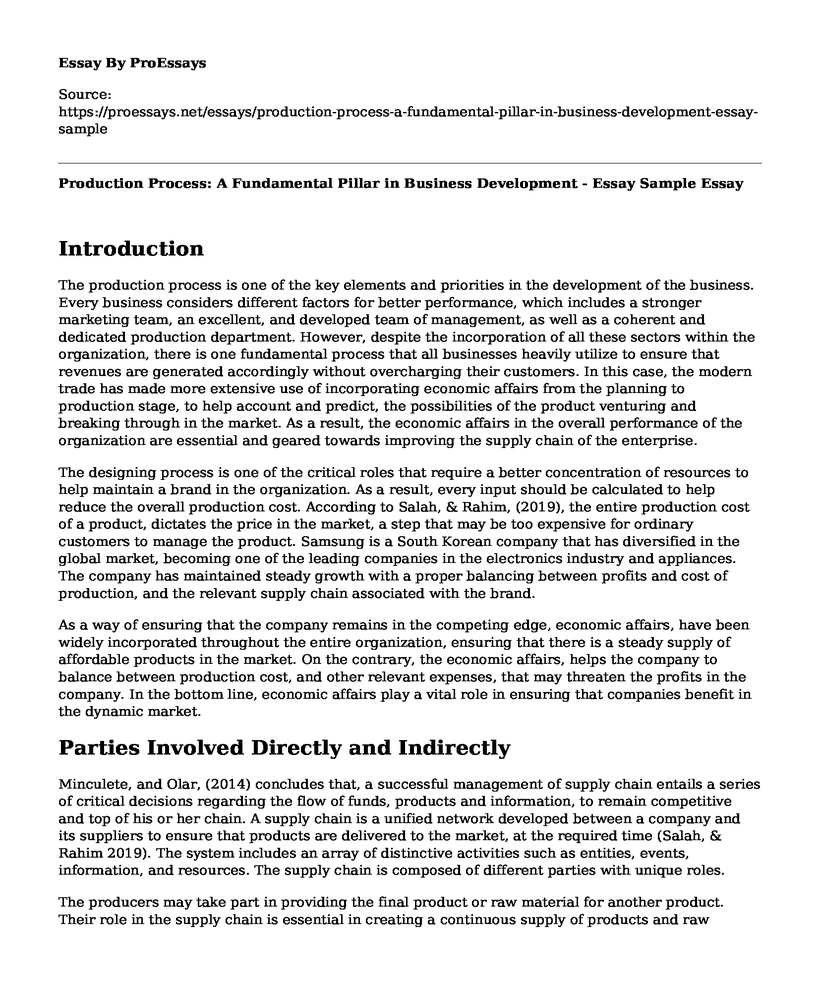Introduction
The production process is one of the key elements and priorities in the development of the business. Every business considers different factors for better performance, which includes a stronger marketing team, an excellent, and developed team of management, as well as a coherent and dedicated production department. However, despite the incorporation of all these sectors within the organization, there is one fundamental process that all businesses heavily utilize to ensure that revenues are generated accordingly without overcharging their customers. In this case, the modern trade has made more extensive use of incorporating economic affairs from the planning to production stage, to help account and predict, the possibilities of the product venturing and breaking through in the market. As a result, the economic affairs in the overall performance of the organization are essential and geared towards improving the supply chain of the enterprise.
The designing process is one of the critical roles that require a better concentration of resources to help maintain a brand in the organization. As a result, every input should be calculated to help reduce the overall production cost. According to Salah, & Rahim, (2019), the entire production cost of a product, dictates the price in the market, a step that may be too expensive for ordinary customers to manage the product. Samsung is a South Korean company that has diversified in the global market, becoming one of the leading companies in the electronics industry and appliances. The company has maintained steady growth with a proper balancing between profits and cost of production, and the relevant supply chain associated with the brand.
As a way of ensuring that the company remains in the competing edge, economic affairs, have been widely incorporated throughout the entire organization, ensuring that there is a steady supply of affordable products in the market. On the contrary, the economic affairs, helps the company to balance between production cost, and other relevant expenses, that may threaten the profits in the company. In the bottom line, economic affairs play a vital role in ensuring that companies benefit in the dynamic market.
Parties Involved Directly and Indirectly
Minculete, and Olar, (2014) concludes that, a successful management of supply chain entails a series of critical decisions regarding the flow of funds, products and information, to remain competitive and top of his or her chain. A supply chain is a unified network developed between a company and its suppliers to ensure that products are delivered to the market, at the required time (Salah, & Rahim 2019). The system includes an array of distinctive activities such as entities, events, information, and resources. The supply chain is composed of different parties with unique roles.
The producers may take part in providing the final product or raw material for another product. Their role in the supply chain is essential in creating a continuous supply of products and raw materials. Secondly, the distributors are the companies involved in taking inventory in bulk directly from the producers, who then deliver the products in a smaller portion to the retailers. The essence of the distributors in the supply chain is to ensure that a considerable distribution of products is attained through breaking the bulk. For the consumers to obtain what they require, retailers come in handy to help buyers purchase a single item. Finally, the consumers seal the supply chain, where they buy products from the retailers, maintaining the circulation of capital.
Indirect supply chain refers to all accounted tangible and intangible items in a business that facilitate the running of the company. The essence of an indirect supply chain is to ensure that the company remains running, and the products are produced accordingly. Through this, the direct supply chain is maintained throughout the system.
References
Minculete, G., & Olar, P. (2014). New Approaches to Supply Chain Management Concept. Logistics Integration of" Hub and Spoke" Model. Valahian Journal of Economic Studies, 5(2).
Salah, S., & Rahim, A. (2019). Implementing Lean Six Sigma in supply chain management. In An Integrated Company-Wide Management System (pp. 105-111). Springer, Cham.10.1007/978-3-319-99034-7_6
Cite this page
Production Process: A Fundamental Pillar in Business Development - Essay Sample. (2023, Apr 08). Retrieved from https://proessays.net/essays/production-process-a-fundamental-pillar-in-business-development-essay-sample
If you are the original author of this essay and no longer wish to have it published on the ProEssays website, please click below to request its removal:
- Food Service Industry
- Why It Is Worth to Open a Restaurant Essay
- Evaluation Essay on Restaurant
- Essentials of Business Law Paper Example
- No Fuss, No Gimmicks, Great Coffee Made Simple: McDonald's Cafe Shop Essay
- Genki Sushi Shop Globalization Paper Example
- Essay on Pizza Hut Reaps Benefits From Technology: Innovative Sales Processes







